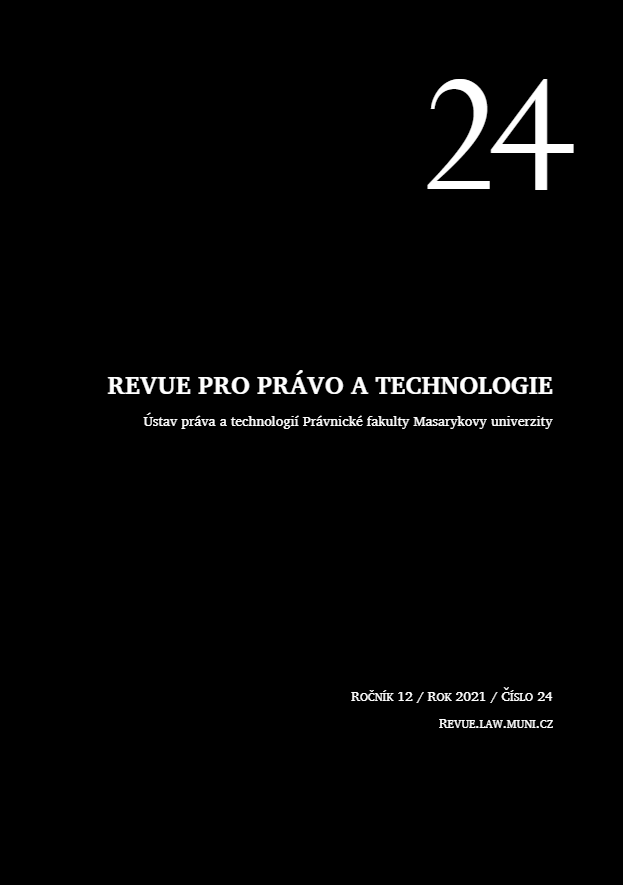
We kindly inform you that, as long as the subject affiliation of our 300.000+ articles is in progress, you might get unsufficient or no results on your third level or second level search. In this case, please broaden your search criteria.

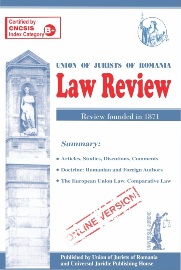
In the study hereby, the author reviews, from the comparative law point of view, the effects that the European Convention on Human Rights and Fundamental Freedoms, as well as the decisions of the European Court on Human Rights, have on the national law systems in some member states (Austria, Belgium, the Netherlands, Germany, Great Britain and Romania), both on the substantive law as well as on the procedural law level.
More...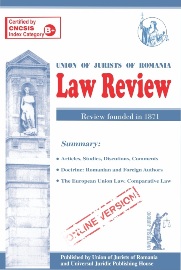
We have recently celebrated two years since the first issue of Law Review came out. Quarterly legal publication in English, in electronic format only, Law Review has published studies, articles, comments, etc. developed by Romanian and foreign authors (academics, researchers and practitioners in the public and private law sphere), being indexed in prestigious international databases. Likewise, there were promoted and debated cases pending before the European Court of Human Rights and the Court of Justice of the European Union. The main columns of the review along these two years have been: Studies, debates, comments. Comparative Law; The European Union Law; International Law; Human rights; Doctrine – Foreign Authors; Law Book Reviews, as well as coverage of major domestic and international legal events.
More...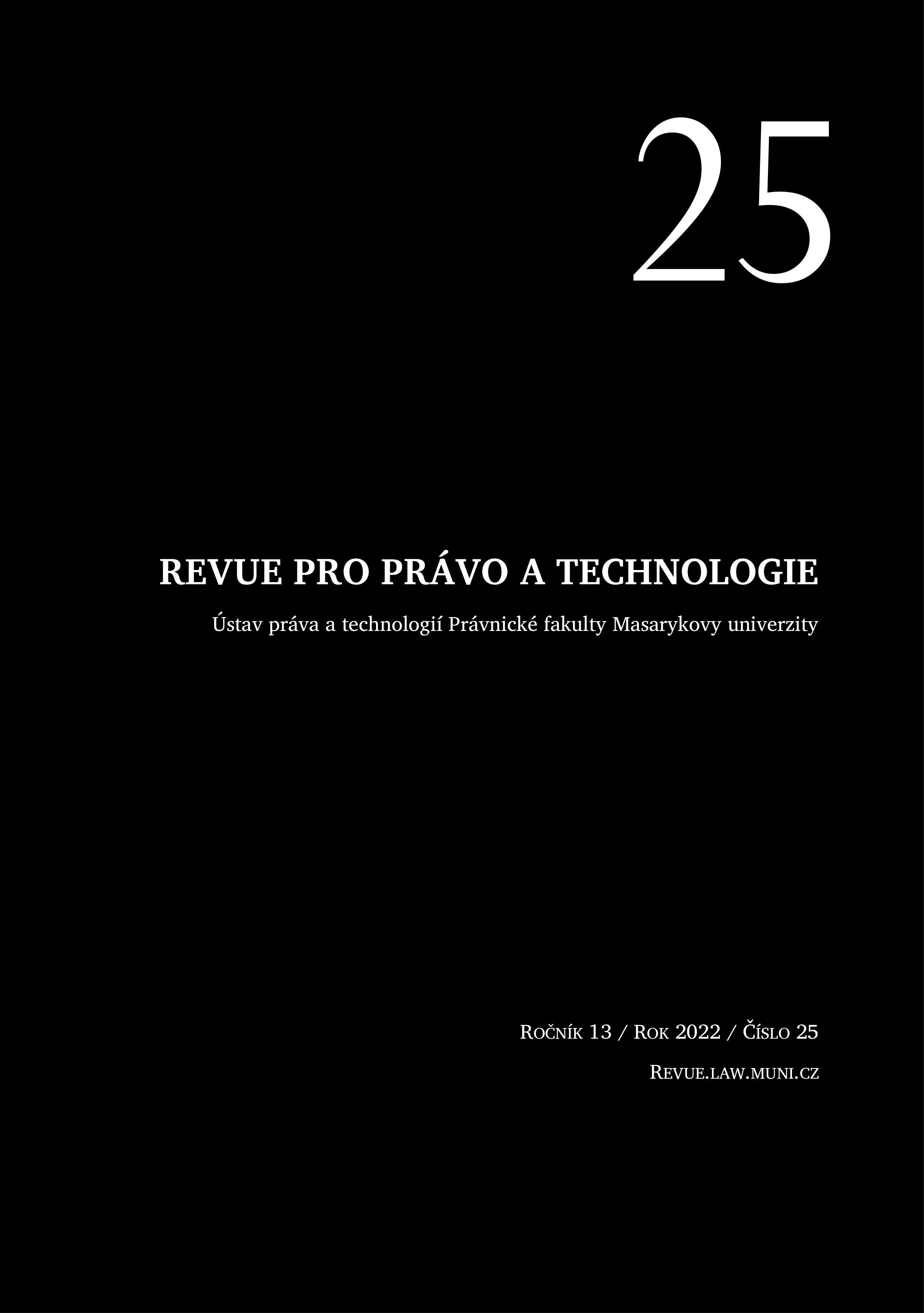
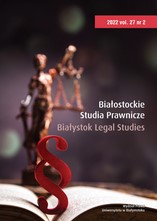
This paper provides a comparison of the regulation of the pandemic in the Netherlands and Poland in order to determine whether a country with a high level of adherence to the rule of law in normal circumstances would also maintain this adherence in exceptional circumstances to a greater degree than a country with an initially lower level of adherence. The central questions posed in the paper are the following: what is the role of the rule of law in regulating the pandemic in the Netherlands and Poland? Is it true that the Dutch government was more successful in preserving legality than its Polish counterpart. By comparing the regulations in the two countries, the paper explores what role the rule of law – in particular, the principle of legality – may play in a crisis situation like this. According to Carl Schmitt, in a state of emergency, order has to be restored first before a return to the ‘normal’ legal order is possible. Does the regulation of the COVID-19 pandemic in the two countries confirm Schmitt’s claim or not?
More...
The aim of the study is to illustrate the problem of freedom of assembly during the COVID-19 pandemic against the background of the experiences of the Republic of Poland and the United States of America. This freedom is provided for in the constitutions of both states, which implies that public authorities are obliged to implement it also in COVID-19 conditions. Hence, the question arises as to whether, and if so to what extent, public authorities in Poland and the United States (countries belonging to the United Nations and obliged to consider the standards of human rights protection resulting from international law) applied solutions realising freedom of assembly in the conditions of COVID-19. The authors try to determine the extent of the impact of legal measures applied by public authorities in both countries on the realisation of freedom of assembly and the public reaction produced by these measures. The choice of such a context for assessment was justified by differences in the legal culture of the countries being compared, the structure of the state, and the approach of both the public authorities and the society to freedom of assembly.
More...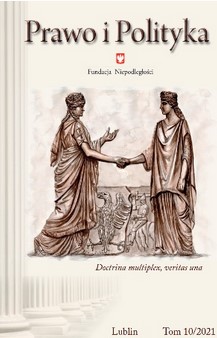
The subject of the article is an analysis of the provisions of four Polish Constitutions adopted in the 20th century, with regard to the model of the organization of state power defined in them, which is implemented by adopting one of the two principles, respectively the principle of the tripartite division of powers or the principle of uniformity of power. The author first presents the essence of each of these two principles. Then he offers a comparative analysis, divided into two parts. In the first part, the author compares the Constitution of 1935 with the Constitution of 1952, which both applied the principle of uniformity of power. Whereas, in the second part, he compares the Constitution of 1921 with the Constitution of 1997, which applied the principle of the tripartite division of powers. The analysis is aimed at presenting and as a result, showing that in the case of adopting the same principle – the tripartite division of powers or uniformity of power by two different constitutions, certain differences are visible in its formulation and practical application.
More...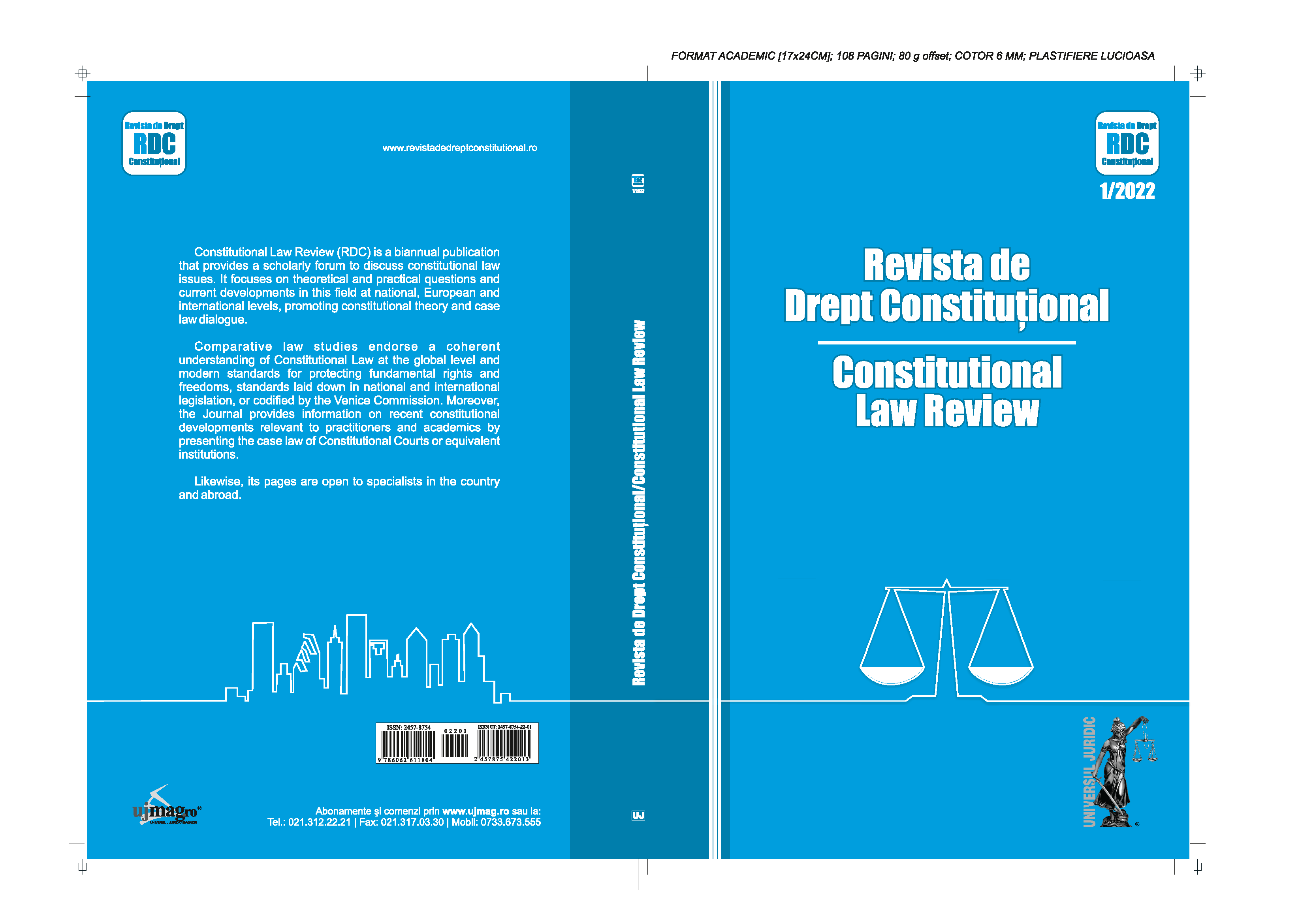
The Romanian Constitution regulates in a limiting way exceptional states, given the “special” legal regime applicable during their development. Although the text of the French Constitution was an important source of inspiration in the process of drafting the Romanian Constitution, the regulation of exceptional states is different in the two Constitutions. For example, in Romania, the state of emergency represents one of the exceptional states regulated by the constitutional text, while in France it is regulated by Law. However, beyond the differences regarding the regulation of the exceptional state, we will be able to observe the similarities in terms of the content of the set of measures imposed by the establishment, in 2020, of the state of emergency in the two states. The main objectives of the research were the presentation of the exceptional states in Romanian and French law, the description and comparison of the state of emergency in both countries and the identification of the challenges that have arisen from this exceptional state. In order to achieve the abovementioned objectives, we used the following research methods: the historical, analytical and comparative methods and the case study. The leading results of the study are getting an overview of the regulation of the exceptional states in Romania and France and of the establishment of the state of emergency in 2020, with implications regarding the way in which the democratic states could ensure the legal order during these “special” times.
More...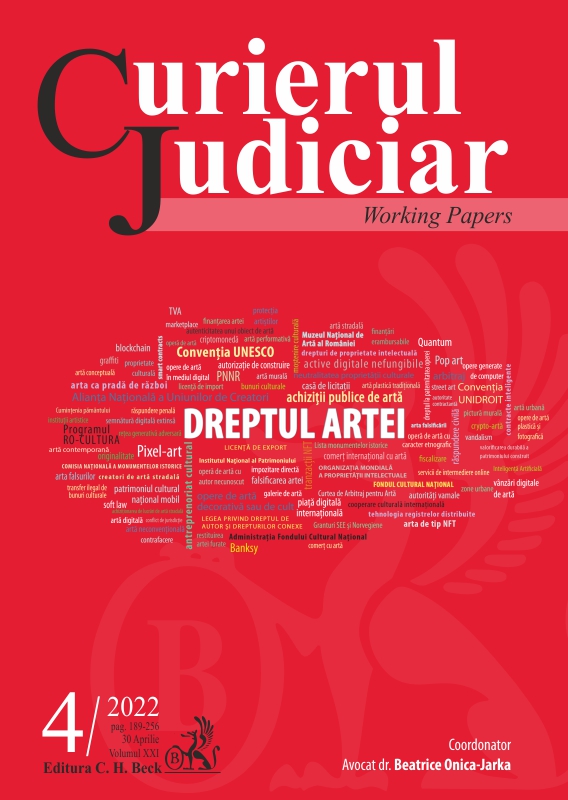
The reactive nature of the legal field is slower than ever in response to the technological realities and the users’ desire for independence and decentralization and major financial phenomena, such as NFTs, remain vaguely regulated in adhesion contracts which most internet users do not read. The purpose of this article is not to frame these relations into national law concepts, but is driven by the need to draw attention to certain concepts which, along with the cited authors, I consider to be legally inaccurate and delicate.
More...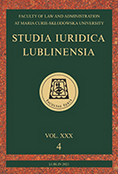
Globalisation has provoked a deep transformation in international law, political affairs and governance with contradictory consequences. It has stimulated the cosmopolitan project of global constitutionalism, transnational integration and the unification of democratic standards. However, it also resulted in the fragmentation of international affairs, the deterioration of constitutional democracy and a feeling of a growing shortage in democracy on national and international levels of governance. Trying to balance the impact of these two opposing trends, the author analyses the positive and negative effects of globalisation on constitutional development regarding such issues as transnational constitutionalisation, democracy and national sovereignty, the changing place of multilayer constitutionalism, the international separation of powers, and the system of global governance in the establishment of transnational constitutional democratic legitimacy. From this point of view, the populist backslide in Central and Eastern Europe (CEE) looks dangerous and unforeseen, but it is a systemic and potentially predictable reaction of global regions on the uneven character of integration, the lack of democratic legitimacy and a new answer to the contortions and dysfunctions of global governance. An adequate response to these challenges could be found in a new concept of constitutional integration based on ongoing dialogue between the transnational and national actors of legal globalisation. This dialogue is possible by using a conflict-mediation strategy, elaborated by international experts, especially, for the deliberation of complex and protracted conflicts, which have no clear practical solutions in the short to medium term.
More...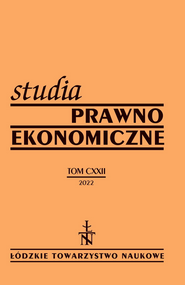
Background: The paper undertakes a research of acquis communautaire regarding VAT grouping. It also analyses the motives for adopting VAT grouping regulations in some EU Member States and examines the circumstances of adopting these regulations in Poland. Moreover, 2021 Polish VAT grouping provisions were analysed within the context of similar arrangements of some EU Member States. Research purpose: Recognition of the motives for introducing the possibility of group VAT regulations at the EU level and the arrangements of said regulations within some EU Member States allows examination of how the relevant regulations have been implemented in Poland. Not only were the legal regulations themselves or their interpretation evaluated, but above all, changes were proposed that should contribute to a more effective implementation of the VAT Directive in this area. Methods: The article uses the method of logical-linguistic analysis of normative material, which is supplemented to the necessary extent by the historical-comparative method. Conclusions: Areas in the Polish VAT group legislation that require clarification or amendment have been identified. In particular, the article indicates the need for changes in provisions concerning the concept of taxable transactions in the VAT group, the application of the coefficient of VAT deduction in the VAT group, and the adjustment of provisions concerning records, including records using cash registers.
More...
The issue of the relations between the European Court of Justice and the constitutional courts of the Member States is a topic of great importance. The latest proof of that is the PSPP judgement of the German Constitutional Court. It has also shown what might happen if judicial dialogue is abandoned. The aim of the paper is to consider the consequences of the PSPP judgement as well as to analyse the conditions for the restoration and development of trust between the courts. The author presents the concept of ultra vires which has been used by the German Constitutional Court. In subsequent parts of the paper, the discussion focuses on the PSPP judgement and the surrounding scholarly debate and points out the consequences for both sides of the dispute. In the author’s opinion, the PSPP saga may, under some conditions, have positive implications for judicial dialogue.
More...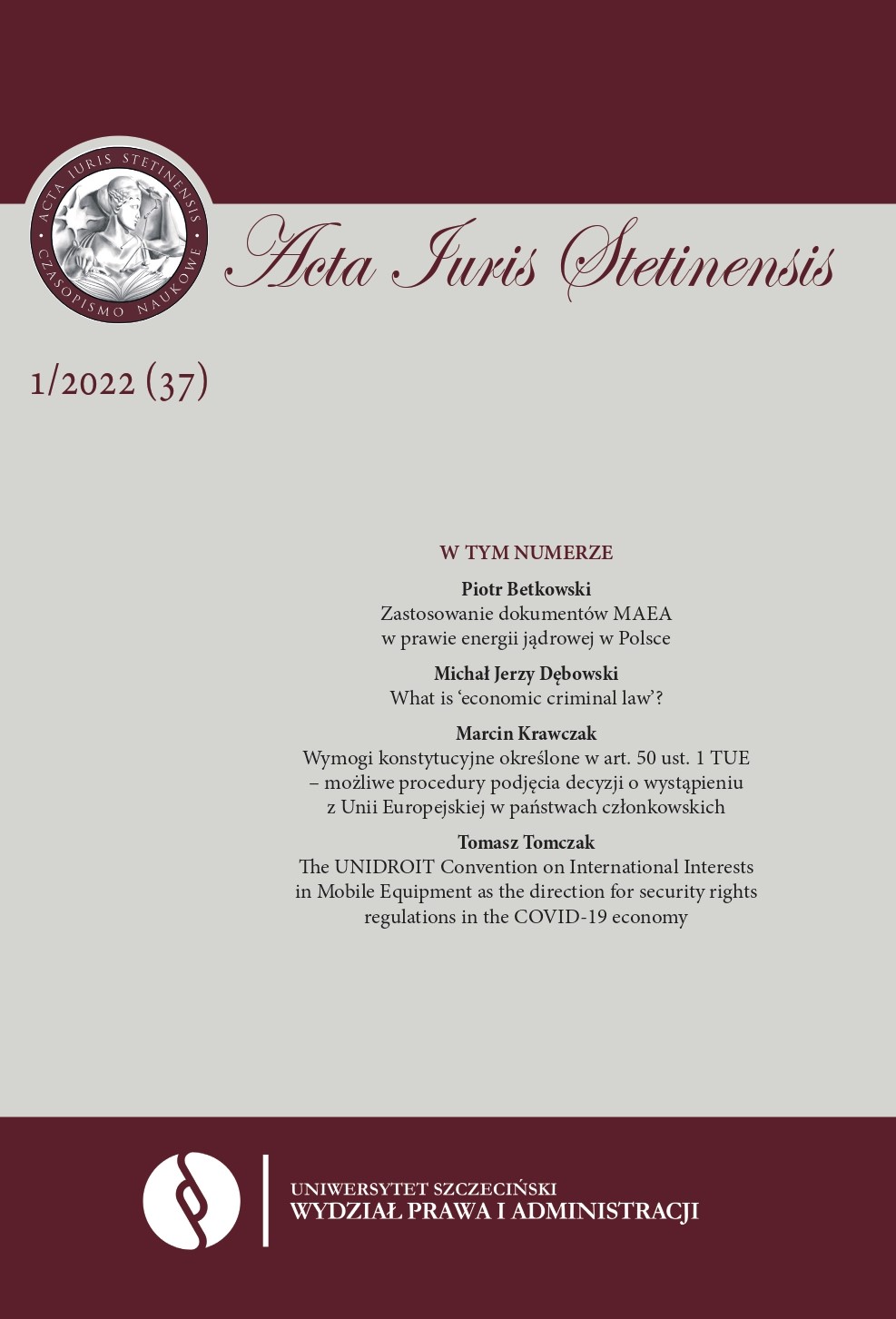
The international regime of nuclear energy law is characterized by the unique combination and mutual influence of binding law and non-binding documents. These documents are adopted by international organizations. One of the most important organisation is the International Atomic Energy Agency, and the guidelines and recommendations adopted by this organisation are considered to be exemplary, hence their worldwide application as soft law. In the article below, the author examines the possibilities of implementing these documents into the nuclear energy law in Poland. The impact of soft law on the development of this law area is also examined, including a demonstration of links between international, European and domestic law. As a result of the research, the author shows that the application of the soft law in the Polish nuclear energy law significantly influences its adjustment to international standards.
More...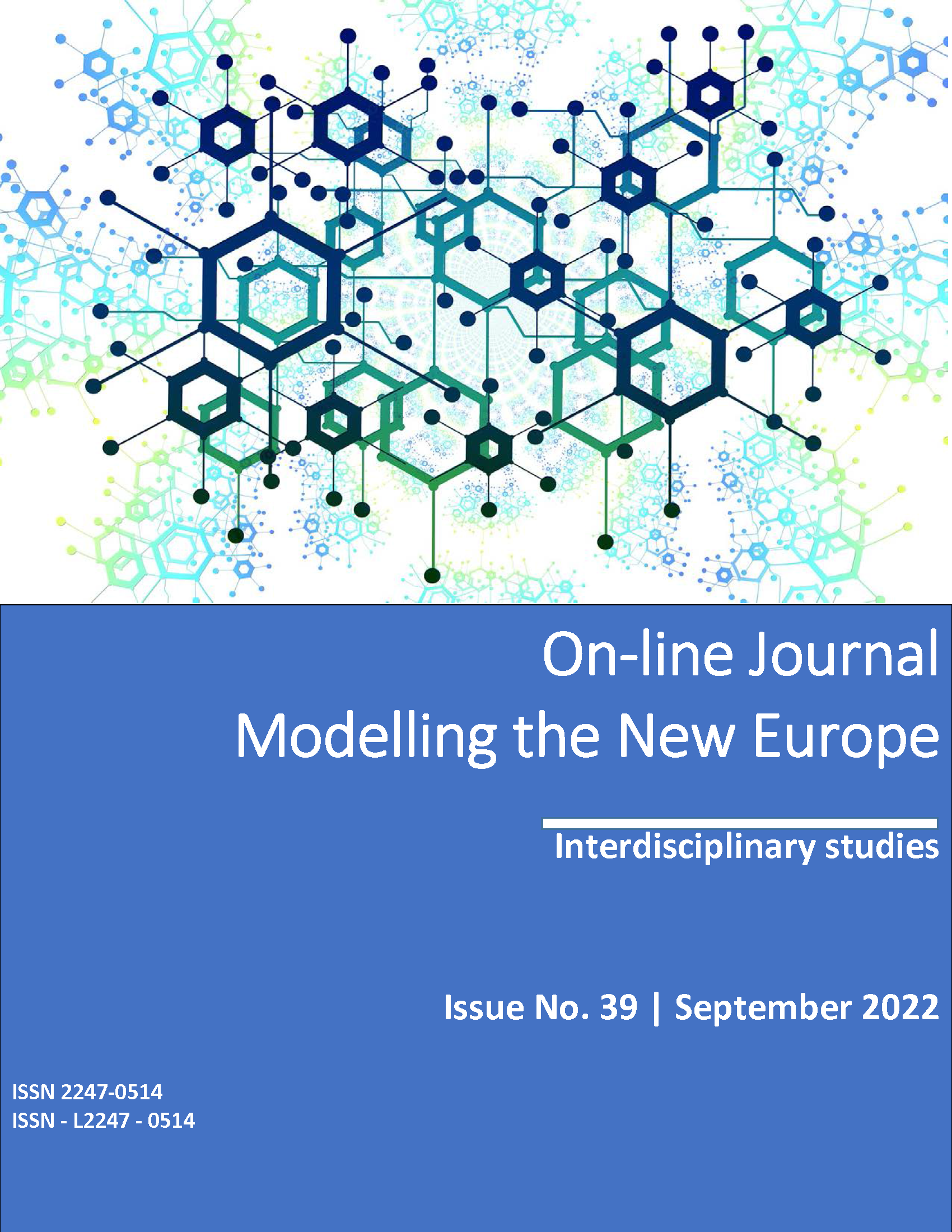
Achieving an optimal work–life balance has been a policy objective of the European Union for many years. Despite progress in this reconciliation, inequalities in the labour market and in gender equality still persist. It should be emphasized that we are not just talking about inequalities in the private sector, the issue of reconciling family and working life is also relevant in local government conditions, and it also affects private and public sector employees who are responsible for families. In the context of European social and legal culture, the legislature, by means of family policy, not excluding legislative measures taken by labour legislation, creates the conditions for workers – women and men caring for children and other dependants – to ensure that they are not subject to economic and social instability. In this study, we analyse the minimum standards of Directive 2019/1158 on work–life balance for parents and carers, focusing on the institutes of maternity, paternity and parental leave. Comparatively, we examine the extent to which the Slovak Republic has adopted legislative measures of family policy with the legislation of Italy.
More...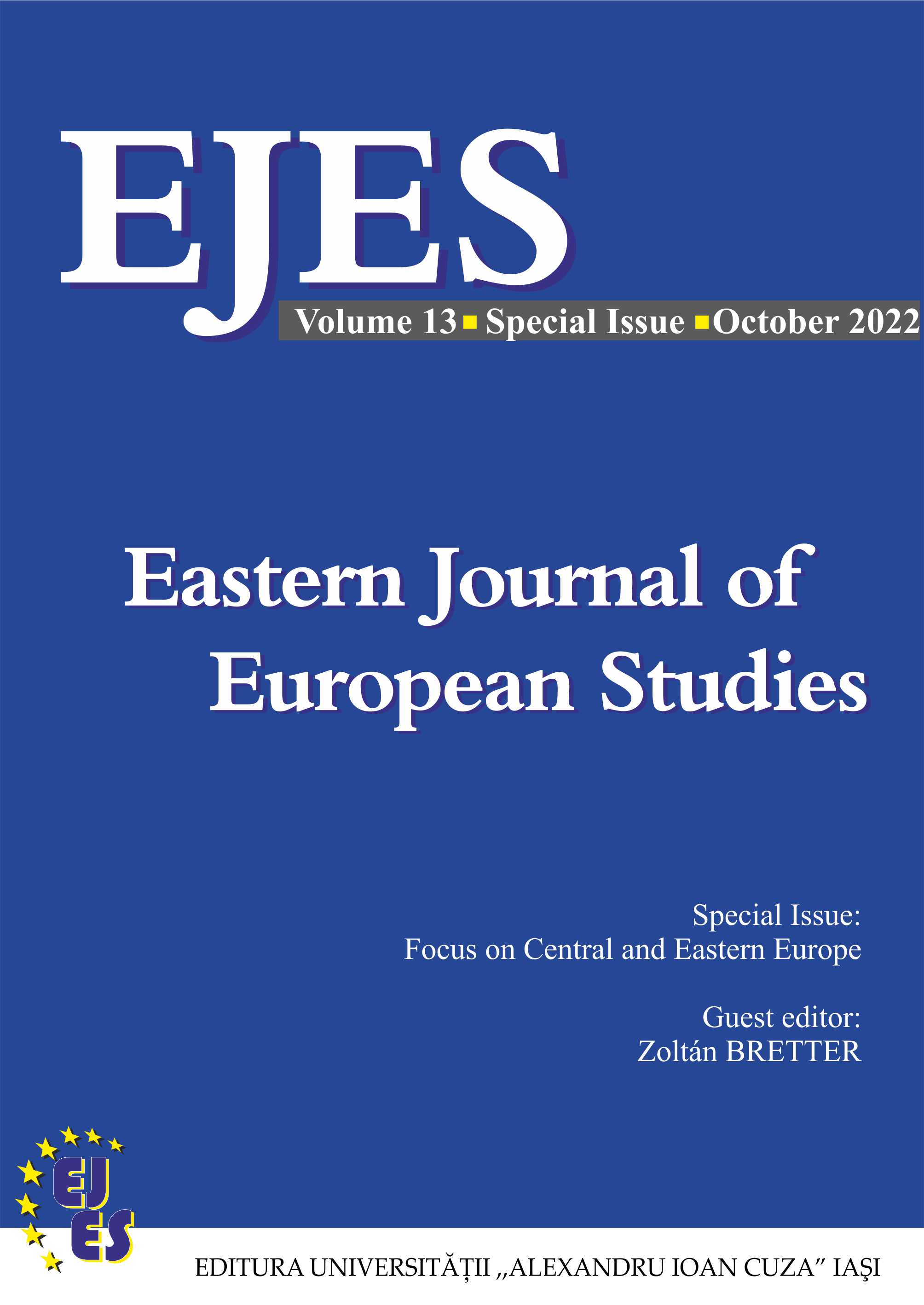
The initial democratic transitions in Central and Eastern Europe resulted in the emergence of re-combined civil societies across the region. The most important were the quality of democracy in individual countries, the resources and strength of independent civic initiatives, the role of the state in financing and supporting emerging civil sectors. Yet, it is the consensus view, that all post-communist countries share weak and structurally deficient civil societies, in fact, correct? This study introduces the way Central and Eastern Europe tackled the state socialist past through the example of Hungary and Poland. The hypothesis that will be verified in the article is that actions taken by the Hungarian and Polish governments lead to increased control and public power over the activities of civil organizations, which limits their development and functioning. Has the civil society been able to form an independent entity within the once politicized state in terms of organization, embeddedness, and national economic importance?
More...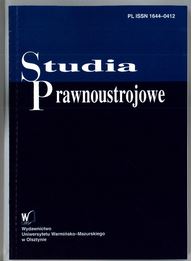
Lately we are facing the new rules of Roman Catholic Church Law, that are also focused on the sexual abuse of minors and its punishment, announced on June 1st, 2021. These new rules should come into effect on 8 December 2021. This occasion offers a good opportunity for analysis of this specific social problem (sexual abuse) and its punishment from the religious and secular perspectives. Authors offers an example of national law of Slovakia in comparison with Roman Catholic Church Law and the way how they deal with the problem of sexual abuse. In this paper, we report on the criminal responsibility of pastors and clerics for the sexual abuse in the light of national criminal law and Canon Law. This is significant because the position of pastor could influence also the responsibility according to secular criminal law, and on the other side, the responsibility in criminal law is not only one and the consequences for clericsm will appear also in the scope of Canon law. The criminal and Canon Law responsibility exist separately but in this case is important to think how they influence each other.
More...
The research is devoted to the analysis of the essence of the shape determinants influencing the contemporary law and order. According to the authors, the following determinants influence the formation, development and state of law and order: the predominant basic values, the processes of constitutionalization and globalization, the ratio of political forces in the state during the period of its constituting, the legal culture of society, the level of economic development of the state, the social essence of the state. The paper establishes that the change of the socio-historical epoch causes the change of social ideals, a person’s goals and the goals of human society, and accordingly, the content of values, including the legal ones. The influence of constitutionalization on law and order is related to: the implementation of the basic values of state-organized society in the Fundamental Law, and then in the sectoral legislation; the formation of appropriate institutions that will ensure the realization of these values. It is also emphasized that under democracy the correlation of political forces is manifested through the political compromise of the elites. From the axiological point of view, legal culture is manifested through the commitment of the elite and the general public to certain values. Economic progress in different countries has inevitably led to the strengthening of constitutionalism. It is concluded that the above-mentioned factors are not stable, they change due to the dynamics of social reality. In addition, the constituting of law and order is influenced (with varying degrees of influence) not by individual factors, but by their totality. Reflecting social reality, a set of factors does not mechanically act as the sum of them – under certain conditions, the factors can both strengthen each other’s deterministic influence and weaken it through the effect of neutralization.
More...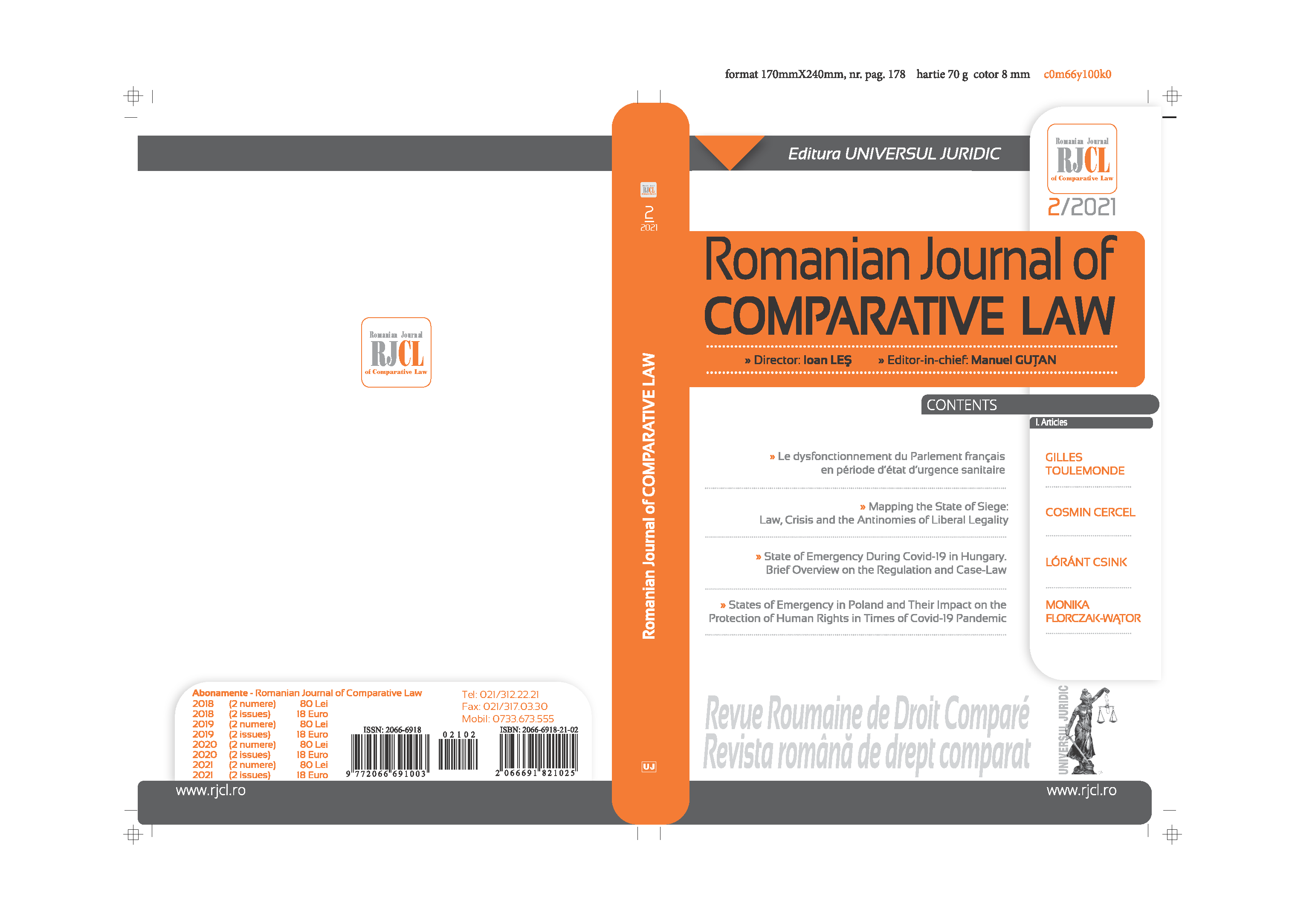
In this article I intend to address a number of salient issues that I consider crucial to understanding and reconstructing historically the legal and symbolic frameworks specific to the dissolution of liberal legality during the interwar era in Central and Eastern Europe. Core to this endeavour is my attempt to grasp the politico-legal specificities of the institution of the state of siege against the intellectual legal historical background marking its transformation from its incipient years during the French revolution towards its apex in mid-19th century, its reception in Romanian context and its unbound use in the interwar era. Drawing on jurisprudence, constitutional theory and the historiography, my intention is to offer a critical legal reading of the concept of the state of siege and to problematise it in relation to the specificities of the rise of authoritarianism in Romania. It thus aims to open the possibility for grasping phenomenologically the features of the state of siege understood here as a constitutional device addressing crisis.
More...
Diplomacy is a state activity focused on international relations with other states and international organizations. It is a unique combination of knowledge of law, politics, and economics that should be applied in foreign policy in order for the state to achieve the best possible position in the international community, that is, international relations. States have always been directed at each other, but today in the globalized international community, no state can be isolated and survive as such. The world is unimaginable without the comprehensive cooperation of states. Multilateral diplomacy as a feature of the contemporary international community has a special role in the conditions of globalization. It is the result of new circumstances in the world and the general connection of states, and the need to solve issues on a global level that often relate to all of humanity. The paper deals with the issue of multilateral diplomacy as an important factor of the globalized international community in which there is a universal connection of states, as well as the need to solve numerous global issues on a wider forum based on the cooperation of all participants in international relations.
More...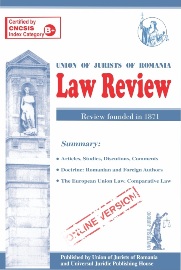
The present study notices that the definitions of cybercrimes raise big problems of hermeneutics. Such crimes were created starting from the premise that computer fraud is a suigeneris crime, which is not to be confused with any of the "crimes against patrimony"" (against "patrimonial rights"), because the latter crimes involve a "material contact" with the stolen object, while cybercrimes are committed "remotely" and, as a result, in their case, such "contact" is missing (does not exist). However, the author considers that this premise is false and that not all crimes against patrimony involve a material relationship with the stolen object. In her opinion, the contrary idea stemmed from the definition that majority civil doctrine gives to the notion of "possession", which is wrong. As Jhering noted, the concept of "possession" does not designate a "state of fact" consisting in the physical mastery of an object, but designates a set of prerogatives conferred by law on the holder of a patrimonial right, by virtue of which he/she may personally use an object or to derive material profit from it, attributing its use to another person. Also, the author considers that many of the cybercrimes disregard the principle of legality, as well as other principles of law, which reveals that the penal doctrine has not clarified its tasks yet.
More...